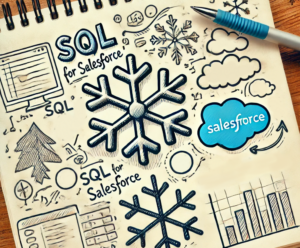
This week, Salesforce Ben released new SQL course for Salesforce that aims to introduce a SQL learning path aimed at professionals who work in Salesforce. My goal for the course was to provide technical training from the perspective where data literacy and translating business questions is the driver to write SQL. In my course, I lean into LLMs, specifically ChatGPT, and even introduce how I use ChatGPT to assist debugging. A the end, anyone who takes the course will learn their way around Snowflake and have a lab built for funnel analytics.
Large Language Models (LLMs), are make it easier than ever to write SQL and Python. Some have made bold claims that learning how to code wont be necessary in the future. Despite advances in LLMs, SQL remains a vital skill in the data-driven world.

Writing SQL without LLM
- Lots of time consumed troubleshooting and debugging SQL
- Reverse engineering other’s SQL
- Manually typing documentation
- Understanding how functions work
- Formatting data to use in expressions
- Understanding data structure and meta data
Using LLMs while Writing SQL
- Paste your code and the error and let LLMs point out syntax issues or how to correct errors
- Break down and explain SQL structure and purpose
- Auto-document SQL
- Relate functions to your existing knowledge
- Auto-prepare expressions with correct syntax
- Explain meta data structure
What you get out of learning SQL course for Salesforce
1. General understanding – Fundamental SQL skills
AI tools like LLMs can write SQL queries, but without a solid grasp of SQL fundamentals, it’s challenging to evaluate or optimize those queries effectively. SQL is more than just a query language; it’s about understanding how data is structured, how relationships are built, and how to extract meaningful insights from databases. SQL gives you the foundation to translate questions into queries and ensures that you’re not just a passive consumer of AI-generated code.
2. Contextual Awareness
While LLMs are powerful, they might not fully grasp the nuances of your specific database environment or the business rules that govern your data. Learning SQL allows you to tailor queries to your unique context, ensuring the results are accurate and aligned with your business needs. This contextual understanding is something that AI, despite its advancements, can’t fully replicate.
3. Collaboration with Data Teams
SQL acts as a common language in the data world, bridging the gap between business professionals and technical teams. When you understand SQL, you can communicate more effectively with data engineers, analysts, and other stakeholders. Understanding the data structures needed for analytics also increases your awareness as you alter the Salesforce data model. At the end of the day, having SQL in your toolkit makes you a more valuable contributor.
4. Troubleshooting and Optimization
Even the best AI tools can generate inefficient queries that may impact system performance. By learning SQL, you gain the ability to troubleshoot, optimize, and refine these queries, ensuring they run efficiently and deliver the desired results.
5. Future-Proofing Your Career
SQL skills continue to be in high demand, with job opportunities in this field projected to grow significantly over the next decade. As DataCloud takes off, employers will value SQL proficiency, as it’s a core skill for data cloud related roles when you need to “bring your own data warehouse.”
More about SQL course for Salesforce
What You’ll Learn:
- Data Query Language (DQL): Focus on querying and analyzing data.
- Salesforce Integration: Learn how SQL concepts align with Salesforce SOQL.
- Practical Skills: Hands-on exercises to build familiarity and proficiency.

